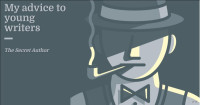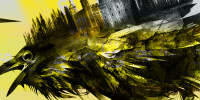
The Odd Over the Obvious
slate.com – Saturday June 28, 2025

This spring’s hot topic of conversation for my colleagues in higher ed was that “Everyone Is Cheating Their Way Through College” article in New York magazine. Most of the fellow professors I spoke with about this were horrified by how often students now can and do let A.I. write their papers. Others are joining their students in asking, Why not?
A surprising coalition—William Shakespeare and 17th-century scribes, as well as 21st-century elementary school teachers, anti-fascist scholars, and epidemiologists—would tell you why not.
A key principle for 17th-century scholars transcribing or translating classical or biblical texts was lectio difficilior potior: The reading that is stranger is stronger. If a word differs between two versions of the text you’re working on, you should actually choose the one that seems to make less sense. That surprising word choice is likelier to have been the original author’s meaning, because it’s likelier that a previous copyist, translator, or (eventually) typesetter replaced a surprising word with one that was more predictable than vice versa. The wisdom was: Don’t let an easy, commonsensical option erase a unique and potentially more interesting and challenging statement.

The Plight Of The White Male Novelist
defector.com – Tuesday June 24, 2025

In July of 2022, Joyce Carol Oates tweeted that her literary agent friend told her editors are no longer interested in reading first novels by young white male writers, “no matter how good.” She was saying this in support of an article by former New York Times columnist Pamela Paul, who argued that the publishing industry is being destroyed by “illiberal scolds” keen to stifle free speech. Among Paul’s examples are the industry’s recourse to sensitivity readers, who ostensibly scold authors, and the backlash against 2020 bestseller American Dirt on the grounds that its white author Jeanine Cummins was not the right person to tell the story of poor Mexican migrants. Paul is implying, in other words, that calls for publishing to address its whiteness problem amount to a form of woke censorship. In sharing Paul’s piece and adding her own anecdote about young white men being overlooked, Oates was connecting their fate to Paul’s complaint: White men are the victims of the industry’s takeover by the DEI mafia.
The idea that white male writers today face diminishing opportunities has since occasioned considerable debate and several attempts to lay out in greater detail the forces behind their recent marginalization. Jacob Savage’s explanation is that they are “vanishing” because, having been castigated as toxic masculinists and told there are no “Good White Men,” they no longer feel that they are allowed to have a voice. Tim Lott argues that an industry now dominated by women editors and agents, who are naturally biased toward manuscripts that center their own experiences, is guilty of the same inequality that women once complained about, except now it is men who are excluded.

What can right-wing authors do?
thecritic.co.uk – Monday June 23, 2025

Writing has always been a lonely business, publishing a cruel one. We aspiring novelists know that better than anyone. (Which of us hasn’t scrolled through endless Famous Writers Who Got Rejected blog posts, taking a perverse sort of pride in receiving more No Thank Yous than William Golding and J.K. Rowling combined?) Given the sheer number of query letters literary agents are swamped with every week, how is our literary potential — assuming, of course, that we have any — ever to be spotted?
These days, though, there’s an even greater obstacle in our path: left-leaning gatekeepers. And when I say leaning, I mean tumbling. For those of us who don’t subscribe to the latest ideological fads, the chances of seeing our books in the hands of readers who don’t share our name or flat have grown depressingly slim.
When researching agents and publishers for my children’s book, for instance, I found very few who did not explicitly ask for stories by or at least featuring disabled, neurodivergent, LGBTQ+, ethnically diverse or feminist voices. If only I’d penned a middle-grade novel about two feisty trans-girls of Nigerian extraction on their first trip to the moon in a wheelchair. Whether masterly or not, my own manuscript, with its podgy, posh, wannabe-centurion narrator, was bound to be dismissed out of hand for its lack of “diversity”. It’s difficult not to become disheartened.
I was therefore delighted when earlier this year The New Culture Forum (NCF) announced its first Literary Festival. It promised aspiring authors both practical guidance and the presence of publishers. Announcing the festival on GB News, the director and founder Peter Whittle said, quite rightly, that there would be no point to it unless it helped non-woke writers to get published: ‘it can’t just be a talking shop.’

Kate McKean on the Nuts and Bolts of the Query Letter
lithub.com – Friday June 20, 2025

A query letter is a cover letter. That’s it. I know it’s not that simple, but I really want to take away some of its power. Yes, sometimes that’s all an agent will see of your work. Yes, that means it has to do a lot in a little space. But trust that agents recognize how hard this part is, and we know how to spot something interesting through all your nervousness and posturing and meaningless typos.
I like to break down queries into several smaller parts so you can tackle them one by one, and then make it your own.
Salutation
First, we start with a salutation. This is a letter, after all. You should address it to someone. Dear Kate is an acceptable salutation. Yes! Even my first name! I don’t care.
If you are not comfortable with that, you can write Dear Ms. McKean. If you are not sure of an agent’s gender, honorific, or marital status, you can write Dear Kate McKean. All fine options! Just avoid assuming a gender binary or anyone’s marital status. Please do not write To Whom It May Concern or Dear Agent. That just makes me feel like another number on your list. If you spell an agent’s name wrong or use the wrong honorific, just take a deep breath. It’s OK! Typos happen! Lots of people think my name is Kate McLean for some reason. We understand. Do not fall on your sword in follow-up emails. You may send an apology email if you must, but queries are hard and we are all human. Try better next time.

What Writing For Kids Taught Me About Killing Off Adults
crimereads.com – Thursday June 19, 2025

In writing for children, suspense often takes the form of whispers. A note slipped across a desk. A shift in a friend’s tone. A secret whispered during a sleepover. When I dove into writing an adult thriller, those whispers darkened into something more sinister: gaslighting, betrayal, sabotage. Humans hurting other humans on purpose, in terribly cruel ways. Are You My Mother? is a far cry from The Perfect Mother, to be sure, but leaping from one genre to the other wasn’t as arduous as you might think. In many ways, writing for kids taught me exactly what I needed to know to write for adults, especially when it came to thrillers.
The tools, after all, are remarkably similar. It’s the stakes—and the monsters—that change.
Pacing Is Non-Negotiable
Young readers are merciless. If a book fails to grip them right off the bat, that’s it. They’re done. In writing middle grade and YA novels, I learned this quickly. Each scene had to earn its place. Every page had to pull its weight. Long internal monologues or quiet ruminations? Forget it. Momentum was king.
This same discipline became essential when I turned to writing a thriller. In this genre, pace isn’t simply about avoiding boredom; it’s about tension. The plot must press forward, dragging the reader along whether they like it or not. Whether it’s a dead body on page one or a marriage unraveling by chapter three, the story’s engine has to stay hot. Writing for kids taught me how to keep that engine running. When in doubt, I cut ruthlessly, the way years of facing impatient twelve-year-olds trained me to do.

My advice to young writers
thecritic.co.uk – Sunday June 15, 2025

You are, let us say, a “young writer” on the south side of 40, chastened by the findings of the latest industry survey — these show that the mean authorial salary is around £7,000 p.a. — but with your first book contract lying on the desk before you.
The Secret Author would like to congratulate you, whilst proffering a few tips on how you might be able to sustain the career on which you have so optimistically embarked.
Civility is all. The old adage about being polite to the people you meet on the way up as you may very probably meet them again on the way down was never truer than on Grub Street.
Have a smile ready for the shy girl checking the proofs at the Literary Review: she will doubtless end up editing Vogue. The junior assistant who brings in the tea at Front Row is almost guaranteed to be controller of Radio Four 30 years hence.
The same rule applies to book reviewing. The author of the feeble novel you trashed in 2019 will, inevitably, be judging the literary prize for which your darling work is entered in 2029; no slight is so mild that it won’t be repaid with interest decades down the line. The Secret Author is still having trouble with a woman whose book he made the mistake of mildly disliking back in 1995.
Watch your politics. Whatever your private ideological leanings, always publicly proclaim an attachment to the left-liberal Guardian/New Statesman/London Review of Books line. Nobody ever got anywhere in the modern literary world by saying that they voted for Brexit or claiming that Nigel Farage is unfairly maligned.
Similarly, make sure you return publishers’ diversity surveys with all the right boxes ticked. If you were privately educated and went to Oxbridge, either keep quiet about it, make wry, self-deprecating excuses, or say things like “at least at college you could meet real people for the first time”.
Notwithstanding the previous paragraph, always try to write for right-wing newspapers and magazines instead of left-wing ones. The former pay better, do so on time, tend not to muck you about editorially and give better parties.

Five top tips for adapting a short story into a novel
scottishbooktrust.com – Saturday June 14, 2025

Former New Writers Awardee and recently published author Alessandra Thom shares her top tips for adapting a short story into a novel.
The step from writing short stories to novels can seem insurmountable. Writing a short story of a few thousand words is vastly different from a novel of tens or hundreds of thousands. If a short story is a drop of water, a novel is the loch it falls into. But if you can write a short story, you can write a novel. All the elements, though different, are there: building suspense, developing character, creating a compelling plot and a vibrant setting, utilising themes and motifs.
I wrote my first novel by taking a short story I’d already written and adapting it. Here are my five top tips to help you do the same.
Read, re-read, then read again
Read your short story from beginning to end, then read it again. If you can, print it out so you don’t fall into editing it. Go over it with a pen, or add comments on your computer, highlighting moments you think are intriguing. These could be moments where it’s evident you’re only seeing one side of a character, or moments where there is a plot door open that your characters don’t walk through, or simply moments that make you feel something.
You’ll learn what kind of novel you want to write by discovering what resonates with you, and what opportunities excite you.

10 Novels Agents Have Seen a Billion Times, and How to Make Yours Stand Out
electricliterature.com – Saturday June 14, 2025

It is not easy to write a book or get published. I’ve been a literary agent for almost 20 years, and I’ve written six books myself, most of which are tucked away in a drawer. As an agent, I receive hundreds of query letters every month, all vying for a spot on my list and a chance to go out to editors to see if they’ll get published, too. It’s daunting to say the least.
The first battle is figuring out what to write. Clearly everything has been done before, no? I see familiar concepts and tired storylines every day. But if there’s nothing new under the sun, how can writers stand out to agents and editors while also giving readers what they want and maybe taking advantage of trends?
There’s so much to say on this topic that I basically wrote a whole book about it. Writing Write Through It: An Insider’s Guide to Publishing and the Creative Life helped me better understand how writers can navigate the weird, opaque, and confusing publishing landscape. There are no shortcuts or sure things, but my bird’s eye view of the industry has given me some insight, starting with what to write.
Way back in 2017, I wrote about the novels literary agents see all the time. No more zombies, I said back then. Now, times have changed! You can write a zombie novel if you want! It’s time for an update. I’m back to tell you about 10 novels that fill agent’s inboxes these days, but also how you can make yours stand out from the crowd. You can write anything you want. The key is to think about the reader, too.

The Horror of a Border: Laura Elliott On Writing the Abject
crimereads.com – Saturday June 14, 2025

It’s perhaps the question every horror writer dreads being asked the most, yet it happens with alarming frequency. Recently, this question was asked by my mum, a woman who, by her own admission, “doesn’t like anything that couldn’t be real”. Nevertheless, a couple of months ago she gamely read an advance copy of my debut horror novel, Awakened, and then called to ask me: why?
It was a question I’d expected, and on that afternoon, phone in hand as I reorganized my kitchen cupboards, my first impulse was to reassure her that my fascination with horror came from a desire to understand the darker impulses of humanity, rather than because I harbored any disturbing proclivities towards violence myself.
However, after I hung up the call, I began to think a little more deeply about why horror has always drawn me in. What is it about this particular genre that keeps on pulling me back?
Certainly, as a disabled woman, on the face of it horror isn’t the easiest genre to find a comfortable home in. It’s a place where disability is often used as a lazy “narrative prosthesis”—or visual shorthand—for moral or social decay. Where women suffer gratuitously, and sometimes sexually, at the hands of monstrous men.

The Rise of Indie Authors: Why Self-Publishing is Booming in 2025
rollingstone.co.uk – Friday June 13, 2025

For decades, the overarching umbrella genre of fiction has continued to dominate the bookish community. While it remains considered the most popular form of literature, how authors produce and publish their work has significantly shifted.
As reader behavior fluctuates and accessibility to technological advancements increases, these systemic changes power a surge in independent fiction publishing.
Out with Gatekeeping, In with Algorithms: A Modern Publishing Economy
The need for traditional fiction publishers and the print market has declined since 2018. Fortunately, this drop did not indicate that consumers were no longer interested in reading books. Instead, seasoned authors ascribe the decline to a rise in self-publishing practices. Self-publishing empowers indie authors to surpass conventional publishers and spread their written works more directly. Although many might assume e-books would hold their ground, the comprehensive electronic book market for legacy publishers has also endured a downturn. That said, the growing prominence of digital audiobooks somewhat counterbalances this slump.
Publishing platforms like Wattpad, Vella, Ream, and Amazon’s Kindle Direct Publishing (KDP) have removed most of the friction associated with regular fiction distribution. KDP, in particular, continues to impact book circulation by leveling publishing. This Amazon-bound platform provides authors with direct reader access, allowing them to expand the exposure of their pieces.
Get the free newsletter | Submit a news item or article | Get Writers' News for your website





